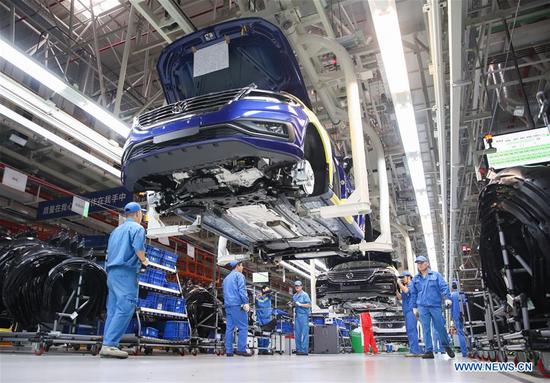China Mobile, China Telecom and China Unicom said that they have completed the expansion of their wireless communication capabilities, which would allow 300,000 people, the estimated daily maximum, to access the internet at speeds of up to 170 megabits per second using their mobile gadgets at the National Exhibition and Convention Center (Shanghai), the host venue of the upcoming CIIE.
The event would also serve as a trial run for the superfast 5G network, which is expected to be rolled out in the near future.
"The installation of an enhanced network needed to be finished within three months, which was quite an urgent task given that it would normally take three years to complete projects of this magnitude," said Weng Zhenxiang, a member of the engineering department of China Mobile's Shanghai branch.
Visitors of large events such as the CIIE often face issues with call connectivity and slow data speeds due to a high concentration of call volume and data usage. To tackle this problem, China Mobile has installed 3,000 signal boosters at the expo site's 34 exhibition halls and its surrounding areas to bolster network coverage, according to Weng.
Meanwhile, China Unicom has set up five 5G base stations in selected exhibition halls and areas to showcase the capabilities of the next generation network, which is many times faster than current speeds.
According to a press release from China Unicom's Shanghai branch, the company will facilitate the broadcast of CIIE-related events in newsrooms using the 5G network. It also noted that the internet connections in the venue have been upgraded to the IPV6 protocol, which supports more addresses than its IPV4 predecessor and thus allows more devices to be connected to the internet.
Shanghai is sprinting ahead to become home to some of the world's best internet practices. The city announced last week that it had completed a gigabit broadband network. This means that customers of China Telecom, the carrier behind this 1 billion yuan ($144 million) network, can enjoy faster broadband speeds of up to 10 gigabits per second while at home.
"Becoming the first gigabit city demonstrates Shanghai's bid to turn China into a cyber power," said Ma Yimin, general manager of China Telecom's Shanghai branch.
"Life in Shanghai has become easier thanks to higher internet speeds, smarter infrastructure and better accessibility to the world through technologies," he said.

















































